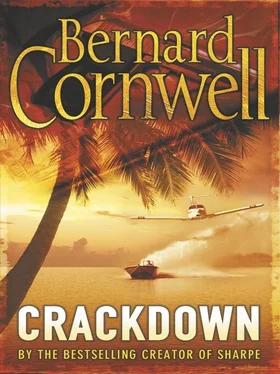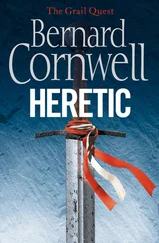“The bastard,” I breathed. In that moment, Hirondelle and her crew had disappeared for good.
The Lincoln’s driver was a uniformed constable who climbed into the sunlight to open the car door for Billingsley. “I told you not to bother,” Ellen said disparagingly as she climbed the main companionway, and I guessed that she had been listening to my conversation with Billingsley by standing just under the saloon skylight which was propped open. Now she stood beside me and watched the white Lincoln drive out of the boatyard. “Didn’t I say you’d be wasting your time?”
“Sod my time,” I said angrily. “Did you hear what he asked about you and me?”
“Of course I heard.” She seemed quite unfazed by Billingsley’s impertinent question whether we slept together, doubtless translating the policeman’s particular curiosity as a general confirmation of men’s innate tackiness. Ellen was more irritated by my answer than by Billingsley’s question. “Why didn’t you just tell him the truth?”
“I did.”
“I mean the truthful explanation.” Which was that Ellen had sworn herself to celibacy while she worked as a cook, a decision that was to me as eccentric as it was both incomprehensible and frustrating.
“I shouldn’t have told the arrogant bastard anything.” I stared at the empty yard where Billingsley’s car had stood. “My God! But I ought to report him! I know what I’ll do! I’ll bloody well call the Belgian Embassy!”
“Don’t be so stupid, Nick!” Ellen was genuinely frightened for me, but she was also indignant at me. “Report him, and you’ll be thrown off the islands before the week’s end! Don’t you understand what’s going on? Are you entirely blind? Don’t you understand that in small countries power is more likely to remain undisguised because there isn’t sufficient societal depth to conceal the realities of institutionalised brutality beneath a respectable fiction?”
But I was not listening to the professor’s explanation. I was feeling disgust at myself. It seemed to me that the stench of Billingsley’s cigar smoke clung to the boat like the sulphurous reek of the pit, and with it lingered the realisation that I had been twisted into dishonesty as easily as a length of rope could be coiled into hanks. I had lied, and I had let myself be used by evil. But all for Masquerade .
Masquerade is my boat. She’s a beauty; a forty-foot ketch built of mahogany on oak. She had been constructed in Hampshire before the Second World War by craftsmen who had taken pride in their work, but fibreglass had made wooden boats redundant and Masquerade had been laid up and left to rot at a boatyard on the River Exe.
I had found her when I was a Weapons Instructor at the Royal Marines’ Lympstone camp in Devon. I had bought her for a song, then spent a fortune restoring her and, when my term of service expired and I could afford to become the gypsy-sailor I had always wanted to be, I left the Marines and made Masquerade my new home. For a couple of years she and I had knocked around the Mediterranean, then I had sailed her across the Atlantic. That voyage had been the first leg of a planned circumnavigation, but those dreams had been brutally shattered when Masquerade was stolen from an anchorage in the Florida Keys. She turned up ten days later, stranded on a coral reef in the Bahamas with most of her gear missing and her starboard bilges half ripped out by the savage coral heads. The thieves were never found.
That theft and recovery had taken place just over a year ago. Now, laboriously rescued by Thessy’s father, a fisherman, Masquerade was standing in the sandy backyard of Thessy’s house where she was cradled by timber props among the casuarinas and palm trees, and where chickens roosted in her cockpit. She needed repairs and she needed love. She needed to feel the sea about her long deep keel again. Her timbers needed to swell with the salt water. She needed me. Which was why I had bowed to the imperative of Deacon Billingsley’s dishonesty, because otherwise I would have lost her.
And I would have lost the chance to sail across the Pacific with Ellen, because Ellen was on the verge of agreeing to come with me, and if I had not yielded to the policeman’s blackmail I would have lost Ellen as well as my boat.
And so I had lied.
A few moments before sundown I extricated Wavebreaker’ s folding bicycle from the big locker on the boat’s after swim-platform, forced the rusting hinges open, then pedalled along Midshipman Road to the glittering block of apartments where our esteemed boss lived.
Matthew McIllvanney was not the real boss of Cutwater Yacht Charters (Bahamas) Limited, which belonged to a retired theatre owner who now lived in Bermuda and was a long-time friend of my father, a friendship that had secured me the job of skippering Wavebreaker when Masquerade was wrecked, but McIllvanney actually looked after the day-to-day running of the charter business. Cutwater’s charter bookings were usually made by agencies in Fort Lauderdale and London, then faxed to McIllvanney’s yard in Freeport where the boats were docked and maintained. McIllvanney also kept a few power-cruisers of his own for charter, and his yard ran an efficient yacht-servicing and marine supplies business, and thus the boundaries between his operations and Cutwater Charters were necessarily blurred and, for all intents and purposes, he could have been said to run Cutwater. He also ran a couple of other businesses that had nothing to do with boats and were probably much more profitable.
McIllvanney was certainly making money from somewhere. Starkisser had to have cost him close to a hundred thousand US dollars, and the Lucaya penthouse apartment, with its private docks and its view towards Silver Point Beach, probably cost ten times as much. He kept a BMW and an old open-top MG in the garage, though his vehicle of choice was a big Kawasaki motorbike. Matthew McIllvanney, even by the standards of the expatriate retired Americans who lived all around him, was a rich man.
I chained Wavebreaker ’s bicycle to an ornamental fence outside McIllvanney’s apartment block, and persuaded the uniformed ape on security that I was not a terrorist. The ape keyed the lift panel so that the elevator would go to the very top floor where it opened directly into McIllvanney’s apartment. I had visited the apartment at least a dozen times, but I still found the fact of a lift opening directly into a living room incredibly impressive; a proof of wealth as convincing as the possession of gold taps or of mink rugs or of the girl who waited to greet me just beyond the lift doors. She was a very tall and very fair and dazzlingly beautiful creature whose skin was goose-pimpled under the impact of McIllvanney’s air conditioning which was set to a level that might have made a penguin shiver. “Hi!” she said enthusiastically. “You’ve got to be Nick! Matt’s expecting you. He’s right outside.” The girl, who looked as though she had been made in heaven out of peaches and cream, was wearing a few pieces of string arranged as a bikini, high heels, the goose-pimples, and nothing else. She nodded towards the screened porch that overlooked the sea. “You’ll have a drinkie, Nick?”
“Irish whiskey,” I said, “no ice, some water, and thank you.”
“You’re surely welcome. My name’s Donna.” Donna gave me a limpid hand to shake, then wiggled her way towards the liquor cabinet. Just to watch her walk threatened to break your heart. She waved a hand about McIllvanney’s apartment. “Isn’t this just the cutest place you ever did see, Nick?”
“It’s very splendid,” I agreed politely. The apartment was indeed attractive, perhaps because it had nothing whatever of McIllvanney about it. The apartment’s previous owners had hired an expensive interior designer from New York and ordered her to trick out the rooms in a horse-country olde-English Spy-Cartoons look, which had been done to extravagant perfection, but McIllvanney was none of those things. McIllvanney was a Protestant bully from the Shankill Road in Belfast, who had learned his thuggery in the hard school of Northern Ireland’s prejudices, honed it in the British army, and now put it to whatever good use he wanted in the Bahamas. If I had been asked to decorate a flat to reflect McIllvanney’s character then I would have given him an East Belfast bar with sawdust scattered on the floor, King Billy strutting on the walls, and blood splattered across its tobacco-stained ceiling.
Читать дальше












